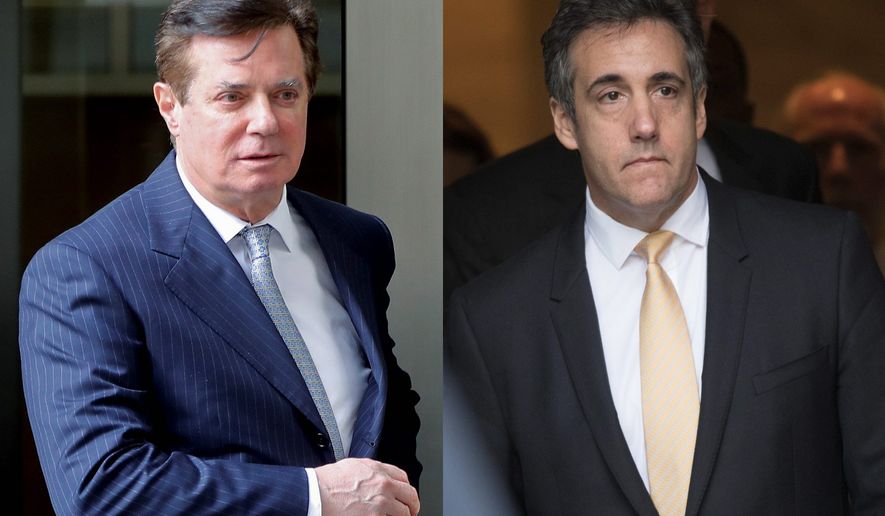Michael Cohen so far has escaped the crosshairs of New York state prosecutors even as they vigorously push to convict another former Trump associate, Paul Manafort, on criminal charges.
But the decision by New York District Attorney Cyrus R. Vance could leave him open to accusations of selective prosecution.
“It is a glaring omission,” said Jonathan Turley, a law professor at George Washington University who said Cohen’s alleged behavior seems ripe for charges to be filed in New York, given that’s the location where much of the conduct under scrutiny took place.
Cohen and Manafort have weaved similar paths through the federal judicial system. They were both ensnared by special counsel Robert Mueller’s probe into President Trump’s associates during the 2016 campaign, yet both were charged with bank fraud, tax evasion and other crimes unrelated to the campaign.
Mr. Mueller handed Cohen’s case off to federal prosecutors in New York and he ultimately pleaded guilty to tax evasion, lying to Congress, campaign finance violations, and making a false statement of a financial institution.
Manafort, meanwhile, was hit with two indictments by Mr. Mueller. In Virginia, he was convicted by a jury of bank and tax fraud and in Washington, D.C., he pleaded guilty to conspiracy and illegal foreign lobbying. All told, he received seven-and-a-half years in prison.
Yet only Manafort is facing New York state charges after a 16-count indictment, one that Mr. Vance announced just as Manafort was being sentenced in Washington.
“There are certainly potential state charges that could be considered in the Cohen framework,” said Kendall Coffey, former U.S. attorney for the Southern District of Florida. “The fact that Manafort is now facing multiple state charges and Cohen isn’t doesn’t establish selective prosecution, but it underscores the potential arbitrariness in the system.”
A spokesman for Mr. Vance’s declined to comment about his decision-making.
But analysts said his decision to charge Manafort seemed transparent: He feared the possibility that Mr. Trump would pardon Manafort, sparing him prison time. The state charges, if successful, could ensure he serves some time behind bars.
“The potential criminal justice system’s need to ensure that Cohen will be held accountable is not the same as it might be for Manafort, if he is pardoned and thus freed from federal punishment for his crimes,” said John Q. Barrett, who teaches constitutional law at St. John’s University.
The key difference, legal experts say, is that Cohen has turned against Mr. Trump, alleging he committed crimes at Mr. Trump’s direction and accusing the president of committing other crimes himself.
Manafort has remained loyal to Mr. Trump. He did agree to cooperate with Mueller’s team and spent 50 hours meeting with investigators. But prosecutors said, at best, he only told them things they already knew and, at worst, outright lied to them.
“Cohen has found a way to be useful,” Mr. Turley said. “There seems to be little interest in Cohen who now represents a threat to Mr. Trump. That magnifies the concern because there seems to be an erosion of the line between politics and prosecutions in New York.”
Rebecca Roiphe, a former New York City prosecutor, said there’s no problem with Mr. Vance having an eye on Mr. Trump and potential pardons when deciding whom to charge.
“A prosecutor’s obligation is to do justice,” she said. “I don’t think the New York state prosecutor would bring charges against Cohen because justice is being done at the federal level.”
Mr. Vance’s indictment against Manafort includes eight counts of falsifying business records to obtain millions of dollars in fraudulent mortgage loans. While that exact charge was not lodged against Manafort at the federal level, the same phony documents were part of the bank fraud counts he was convicted of in Virginia.
It also mirrors a similar crime to which Cohen plead guilty before a federal judge in New York. He admitted making false statements to a financial institution. Like Manafort, Cohen also concealed millions of dollars in debt to obtain a mortgage loan he likely would not be able to secure through honest means.
“If Vance is so concerned about mortgage fraud, he should go after Cohen who didn’t get a very stiff sentence for the same crime,” said Gene Rossi, a Washington, D.C., attorney who calls himself a “true blue Democrat.”
He worried the state charges against Manafort could haunt Democrats if they regain the White House.
“If a Democrat pardons someone for a crime, an aggressive Republican state prosecutor may say ’I’m going to indict that person,’” he said. “When prosecutors act like politicians, bad things happen.”
• Jeff Mordock can be reached at jmordock@washingtontimes.com.




Please read our comment policy before commenting.